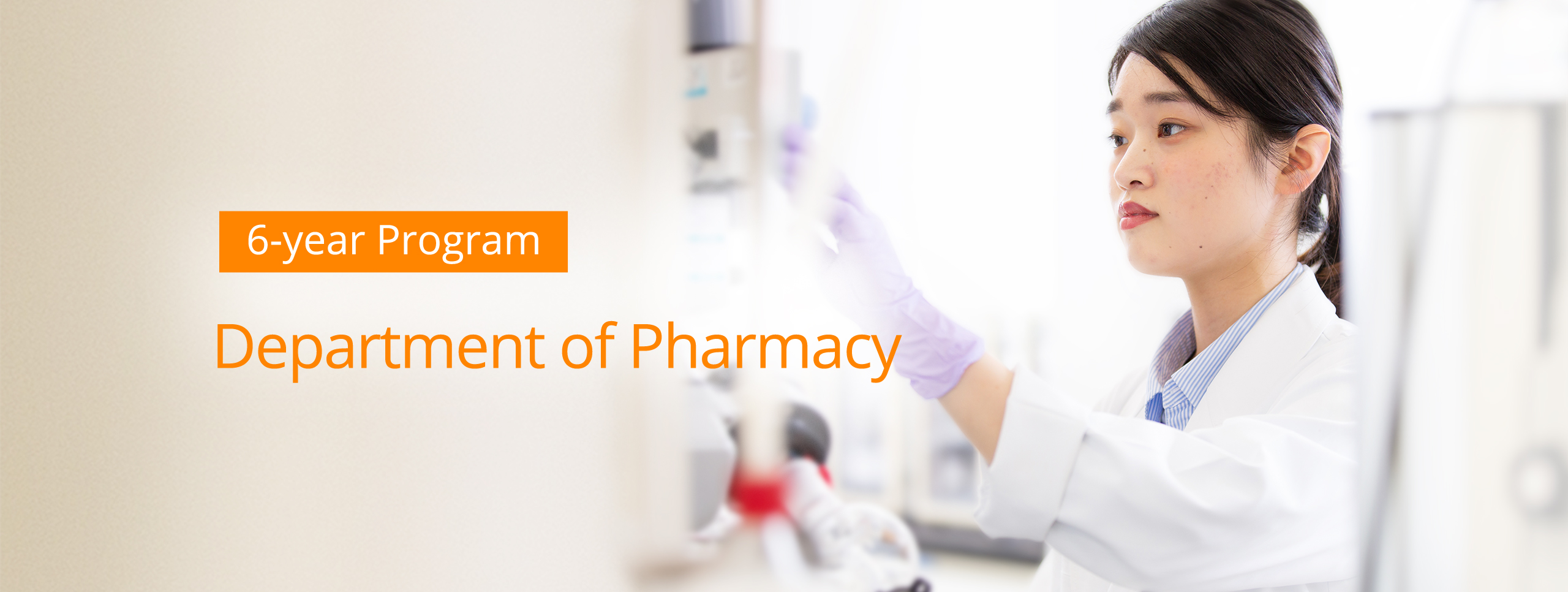To come to the side of those suffering from disease, and aid them in regaining their happiness:
the pharmacist's profession is a noble one.
Will this be your calling? If you feel the call, we would be honored to have you choose our department.
- Message from the Department Chair
- Features of our Department
- Academics
- Department of Pharmacy Curriculum
- Financial Support
Message from the Department Chair
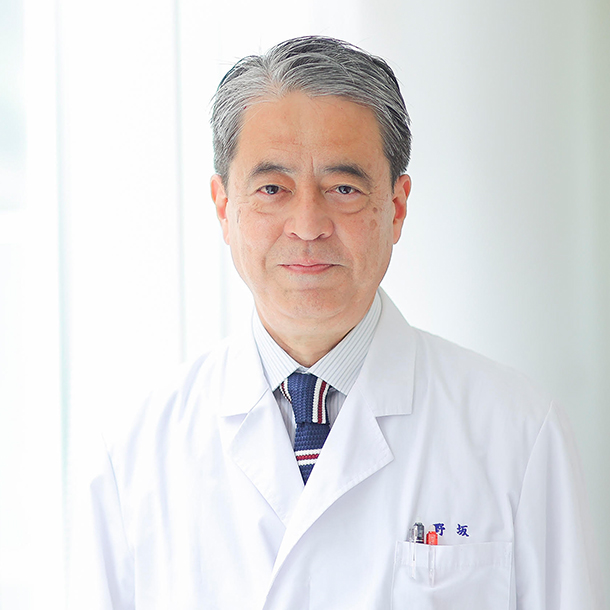
- Chair of the Department of Pharmacy
- Kazuto Nosaka
Our educational policy is to learn the basic skills, then aim for a high-level education in clinical pharmacy. We carry out a course based on the common nationwide Revised Core Curriculum for Pharmaceutical Studies.
Before their fourth year, students in the Department of Pharmacy learn the various kinds of knowledge needed to become pharmacists. This includes studying common liberal arts subjects for a broad-based humanistic education, as is worthy of a university, as well as specific pharmacology subjects and skills training to learn both basic and specialized knowledge necessary to a pharmacist. In addition, as a form of practical hands-on learning, students do early on-site training at hospitals and pharmacies to gain a more concrete outline knowledge of pharmacists' work.
For fourth year students, we offer a curriculum by which, through pre-pharmacy lab work, they can acquire the skills and attitudes required of the pharmacist as medical care provider: from compounding of medicines to fill a prescription, to communication with patients. After learning the foundations of pharmacy, they will take the Pharmaceutical Common Achievement Test that is held in the latter part of the year.
After passing this test, from the end of the fourth year during the Special Term through their fifth year, students will do a long-term clinical practicum of two-and-a-half months each at a hospital and a pharmacy. They will be able to connect the basic knowledge, skills, and attitudes they have acquired over the past four years to practical experience, further growing the abilities they will need as pharmacists.
In addition to this, in their fourth and fifth year (for those wishing to do research, through their sixth year) students will be assigned to a lab of their choice to do graduation research, building up their problem-solving abilities by engaging with research tasks. They will also do integrated study, amounting to an overall summary of what they have learned over the past six years. They will also have the chance to learn more broadly and deeply, with a large number of elective subjects to choose from. We put our focus on enabling our students to develop into pharmacists who excel in their sense of ethics and clinical abilities, and who are able to show initiative.
Six years may seem long. But put effort into studying hard to be a pharmacist, and you can be a help to people who are suffering.
With pharmacological education know-how cultivated through over half a century of tradition, specialized pharmaceutical education from experienced professors, and a system of instruction where students study under the same professor from entering the Department until they graduate, we give solid instruction to students who aim to become pharmacists. However, no matter how complete a system of teaching may be, it is up to students to make use of it and learn. Unless you study actively and make an effort to improve yourself, you will not be able to be qualified as a pharmacist or even graduate from the School of Pharmacy.
To help your dream of becoming a pharmacist who can come to patients as an expert in medicine, and who can contribute to the development of medical care in Japan, we too will be making our best efforts as instructors every day.
Features of Our Department
-
1.Become a Pharmacist with Practical Skills
What society expects from a pharmacist is to have practical skills: one who is able to make clinical use of the knowledge and abilities they have learned.
Our educational policy is to emphasize clinical pharmacology in training pharmacists with practical skills.
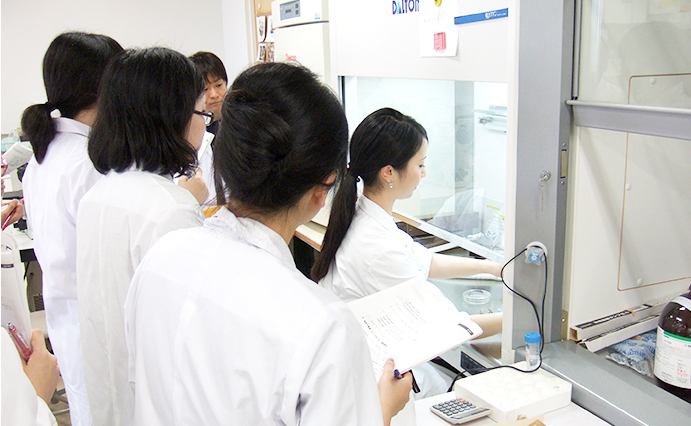
-
2.Support Backed Up with Experience
We have been educating and training pharmacists for over half a century, and have long-accumulated experience of experience of graduate-level education in pharmacy skills.
Our faculty, with their wealth of experience in pharmacological education, will give support, including of course full support for the State Exam, to which experience and performance are key.
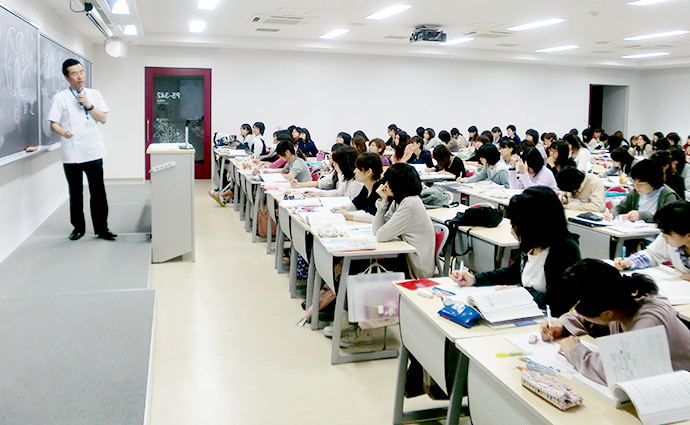
-
3.Establishing Good Study Habits: The Center for Advancement of Pharmaceutical Education
When students seem not to retain enough of what they have learned, in many cases a failure to establish basic study habits may be a major cause.
Therefore, starting early on in their studies in our Department, students learn the basic subjects essential to pharmacology in small groups sorted by academic ability taught by five full-time faculty members, aiming to establish study habits along with improving students' learning level.

-
4.Basic Practical Training in Clinical Pharmacy (Pre-Pharmacy Lab Work): the Center for Education in Clinical Pharmacy
Fifth-year students in our Department do a practicum for eleven weeks in a pharmacy and eleven weeks in a hospital. They train with a teaching pharmacist (a working pharmacist who has teaching qualifications). This is in order to acquire the knowledge, skills and professional attitude necessary for pharmacists, while gaining hands-on experience of the pharmacist's work.
Before this, students in their fourth year do preparatory studies. In other words, the required knowledge is taught in classes, and then the skills and attitudes are acquired through hands-on practical training. This training is carried out by the Center for Education in Clinical Pharmacy, the first of its kind in Japan. Guidance is also provided by members of the Hyogo Prefecture Pharmacists' Association, the Hyogo Prefecture Hospital Pharmacists' Association, the Nishinomiya City Pharmacists' Association, and the Amagasaki City Pharmacists' Association.
The curriculum is structured to enable students not only to take the common pharmacology OSCE (Objective Structured Clinical Examination) in the latter half of the last term of their fourth year, but also to get the most out of their practical training in their fifth year.
Specifically, these are the following types of training:
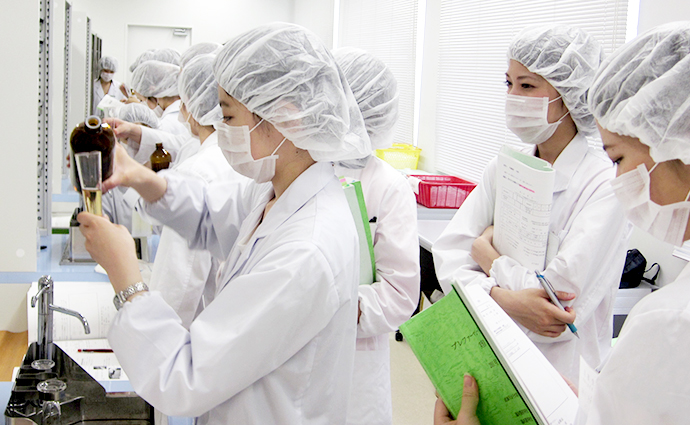
-
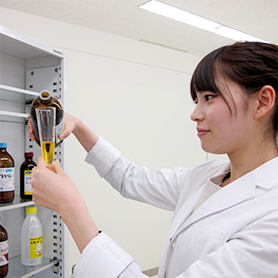
Preparation and Dispensing of Medicines
Students dispense tablets, powders, liquid medicines and ointments based on simulated prescriptions.
They will practice repeatedly until they can compound medicines hygienically and accurately. -
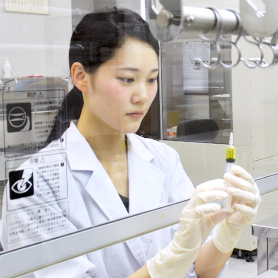
Aseptic manipulation
Medicines for injection must be prepared aseptically. Students learn hygienic ways of washing their hands as well as how to prepare injections.
-
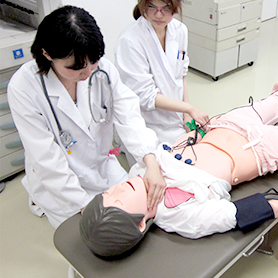
Physical Assessment
In order to see if a medication is really working, and to check for any side-effects, it is essential to have a good grasp of the patient's condition. Using a dummy, students will practice listening to sounds in a patient's chest with a stethoscope, measuring their blood pressure and other procedures, learning what is most important in ascertaining the patient's physical condition.
-
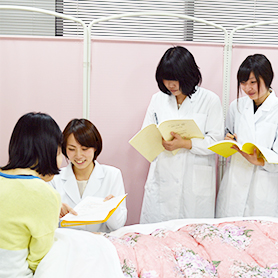
Drug Administration Guidance
Using real medicines and their written instructions, students practice explaining the correct way to take medicine to simulated patients. They will practice this for ordinary medicines sold over the counter at drugstores, as well as for prescription drugs. The most important part of this process is to have consideration for the patient. Students will be taught how to explain in ways that are considerate, while still making sure that patients can take their medicines correctly.
-
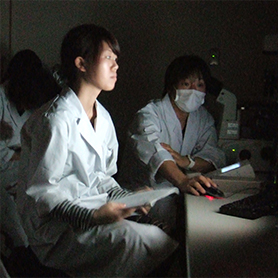
Other
Students also practice using computers to predict the movement of medicines in the body, to search for drug information, and to check for errors in prescriptions or in dispensed medicines.
-
Our faculty will teach these skills and attitudes in detail to each and every student.
Students will train over and over until they are able to put their skills to use at hospitals and other clinical sites.
By doing this, students will be able to face their practicum with confidence.
-
Academics
-
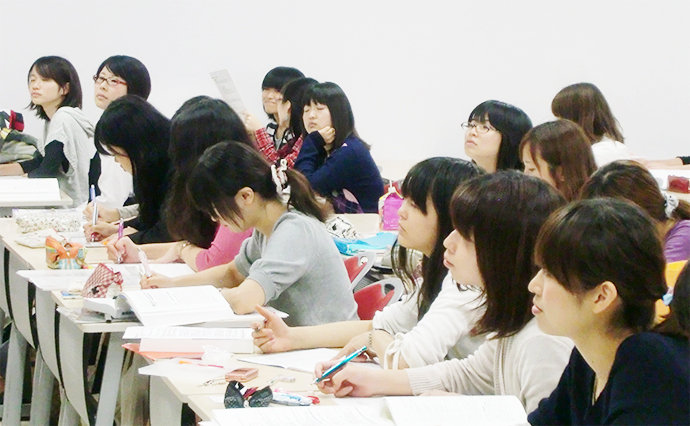
1.Lectures and Seminars
Lectures and seminars, providing a grounding in the knowledge pharmacists need, are carefully taught by experienced teachers following the Model Curriculum for Pharmacological Education so that students can easily acquire the basics.
-
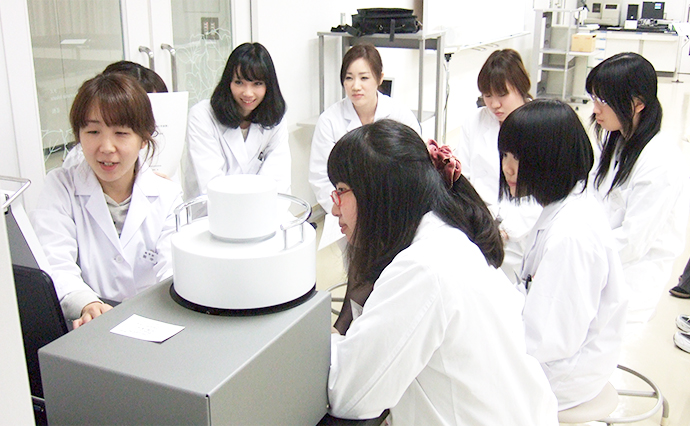
2.Lab Work
In addition to attending lectures, in the lab, students will acquire the fundamental experimentation and observation abilities necessary for a pharmacist. Through lab work they will also deepen their understanding of knowledge learned in lectures.
-
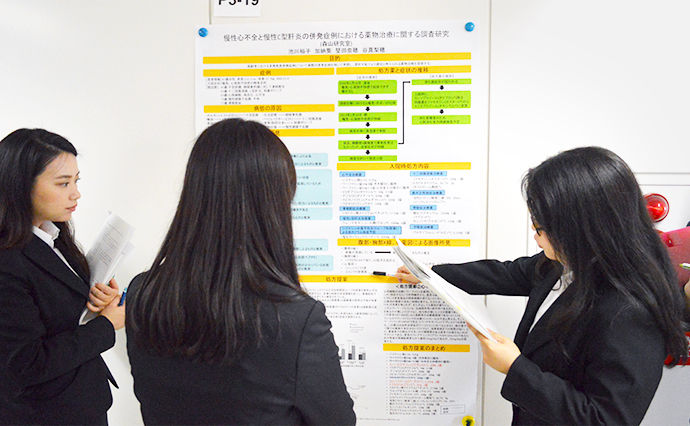
3.Graduation Research
Student's graduation research, on a research topic given, is a summation of their entire undergraduate studies. By participating in research to take on the unknown, students will enhance their problem-solving abilities.
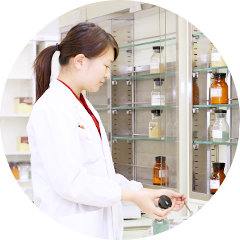
Further Studies
Those wishing to study further--whether to become a researcher, or to be a teaching pharmacist--can continue their studies in graduate school. Our 4-year doctoral program, established in addition to the Department of Pharmacy, has already taken in its first group of students.
Department of Pharmacy Curriculum
※Swipe sideways to see the curriculum.

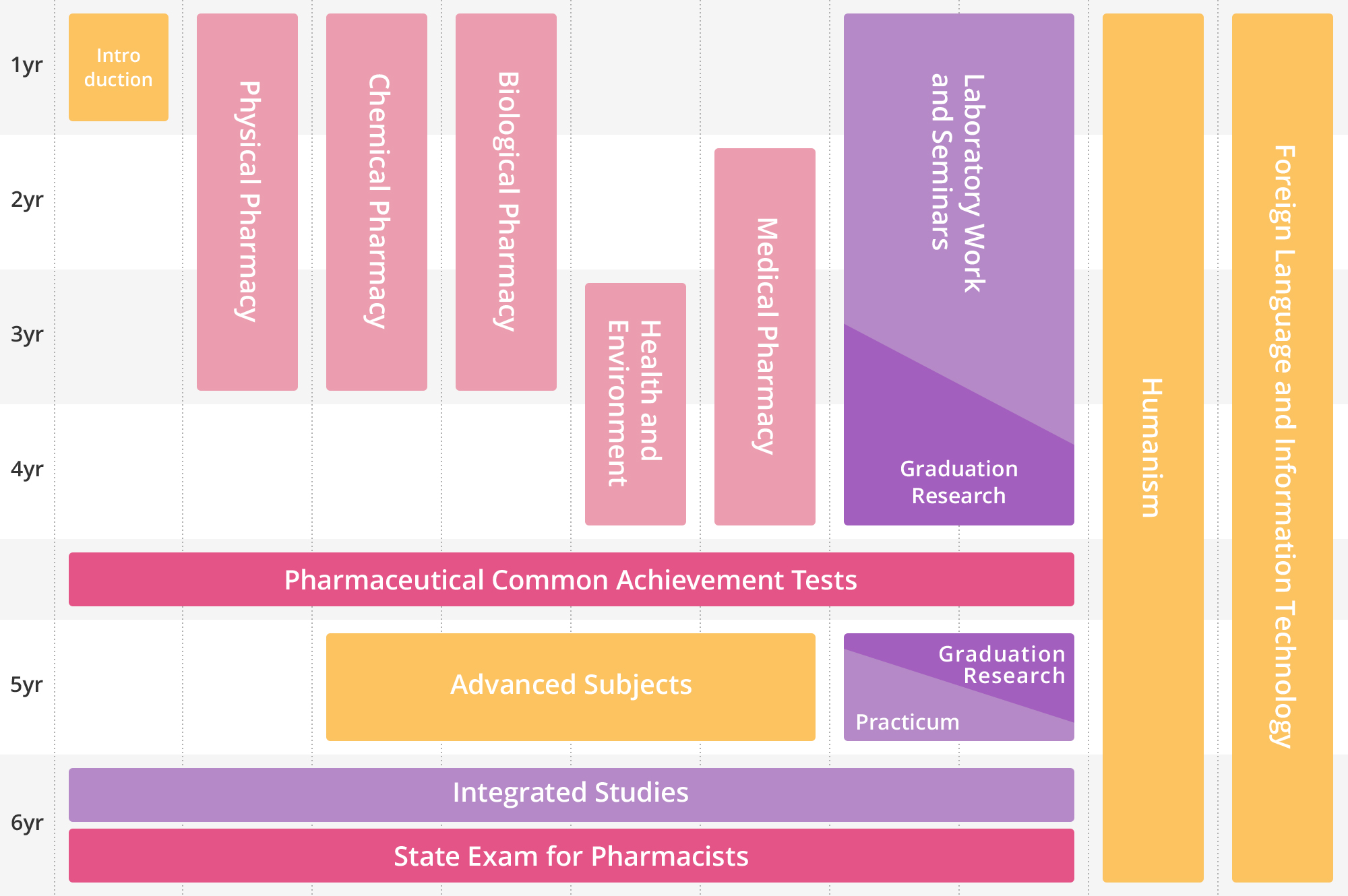
-
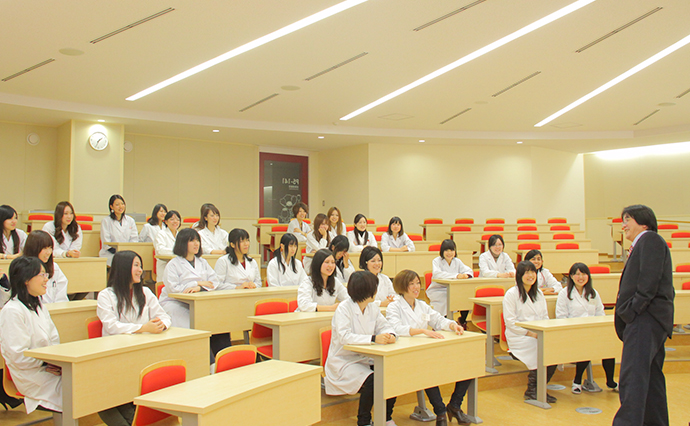
First to fourth yearsLearning Knowledge and Skills
What is medicine? Starting with things that seem obvious, but are not as simple as they look, students will learn all about medicines over the course of their four years, including: why and how are medicines made? Why do they work? When should we use which sorts of medicine?
In addition to this--because being a pharmacist means working woth people--they will also learn the importance of medical ethics and communication. Putting all of this together at the end of the fourth year, as a check test for clinical work, the Pharmaceutical Common Achievement Tests will be taken.
-
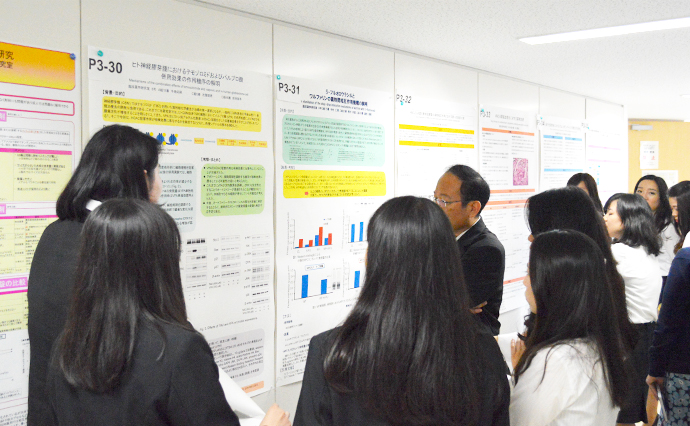
Fifth and Sixth YearsClinical practicum, graduation research and overall review to prepare for the State Exam
Based on the knowledge of pharmacy learned in the first four years, students in their fifth year do a long-term clinical practicum: two-and-a-half months at a hospital, and another two-and-a-half months at a pharmacy.
Here, they learn about the pharmacists' work through experience. Furthermore, each student is assigned to a lab researching a subject they take an interest in. Students there become researchers and start work on their graduation research. Also, in their sixth year, students do a comprehensive review of all they have learned in lectures and labs, preparing them for the State Exam for pharmacists.
Financial Support
Six years is a long time to be studying. As well as time, it can understandably also be a financial burden.
At our University, in addition to the existing scholarship system and the Koue Honor Student system, we also have a system of interest-free loans (1*) to fund your studies, with the aim of lightening the economic burden that comes with the extended term of education.
1* Interest-Free educational Loan System
| Who is Eligible | Fifth- and Sixth-Year Students in the Department of Pharmacy |
|---|---|
| Qualifications | GPA (2*) of 2 or more, and passing the Common Achievement Test |
| Amount | Amount equivalent to tuition in the Department (¥1,500,000 × 2 years = ¥3,000,000) |
| Payment Period | 10 years after graduation (¥3,000,000 ÷ 120 months = ¥250,000/month) |
2* GPA: grades for each class are expressed on a four-point scale, those grades are then converted to numerical values, and the average is calculated.
